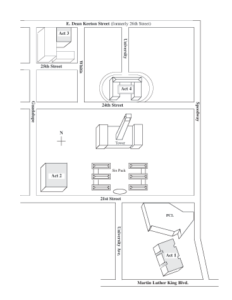Prometheus Unbound
a never-before-staged play by Percy Shelley
directed by madge darlington
co-producers: Michael Simpson and Theresa Kelly, University of Texas, Department of English
Director’s Note: When Michael Simpson showed up in my office a year ago to ask me if I would direct Prometheus Unbound, which according to his research had never before been staged, I told him that I would have to read it first. My first glance at the text revealed some good reasons why it had never been performed – long speeches, dense poetry, characters called Earth and Moon. To be honest, I never fully read the thing before I agreed to direct it a couple of weeks later. Every time I started to read it silently, to myself, I would get lost in an epic simile and fall asleep. What achallenge. From our years of work together, I felt sure that the text didn’t exist that my colleagues in Rude Mechanicals couldn’t perform, and perform well-and a Romantic closet drama seemed like the ultimate test of that hypothesis. During our frantic first year as a theatre collective, ideas about the play would pop up every now and then. Shawn Sides suggested that since the English Department Symposium is about space, we should perform each act separately in a different space on campus. I took Shawn’s brilliant idea one step farther, and decided that the audience would go on a journey through the weekend (much like Asia’s and Panthea’s journey) and see each act at a different time and on a different day until they arrived at the moment and place where Prometheus is unbound. It seemed to follow naturally from this decision that each act would be in a completely different style and each in a different context . That’s how Rude Mechanicals changed Michael Simpson’s original question, “Can Shelley be performed?” into a question for all theater artists and historians, not just Romanticists: “What constitutes perfomance?” I loved these ideas, but suddenly, I had four plays on my hands instead of just one. Enter my co-directors. Deciding to collaborate with a different member of Rude Mechanicals on each act was the best decision I made on the entire project. Lana, Anne, Shawn and Gavin were invaluable in helping come up with a vision that would define each act. Then they each became vital in implementing those visions. Given the denseness and (for most of the performers) the unfamiliaritiy of the text, as well as the grandness of the overall vision for the performance that had evolved, I was daunted by actually beginning the work in early January. Wisely, I followed the example of Jim Ayres, my teacher, boss, and mentor in the Shakespeare at Winedale program and began with the words – we had to understand everything that was being said, had to find the verbs, to wade through the similes, had to find the rhetorical intent of each passage, and only then decide how best to convey the meaning. So rehearsals began in with actors and myself in desks in a circle, reading and understanding the text. With the understanding came an appreciation of the poetry, the ideas expressed and the ideas that are not expressed obviously–ideas crouching in closets of their own, that (had they been expressed in direct political and religious terms at the time Shelley wrote) would have been silenced by censorship. Now, close to the end of the project, the strangeness of Rude Mechanicals taking on this very talky play has receded. Restoring Shelley’s radical ideas to the stage has been an honor and a pleasure, a pleasure I hope you’ll share. I can’t close without acknowledging the vast torrent of unpaid work and talent that has been poured into this project, rightly dubbed by Kirk Lynn “the Ben Hur of Austin theatre.” To borrow from Shakespeare, “I can no other answer make, but thanks, thanks, and ever thanks,” to the cast and crew, who never failed to astonish me with their endurance and inventiveness; to my colleagues in Rude Mechanicals, who remind me with each project why I love to work with them and why I love them; and to Lisa, who has been a fountain of support and to whom I am gleefully bound. — Madge Darlington University Collaborator’s Note “My Prometheus Unbound is just finished and in a month or two I shall send it. It is a drama, with characters and mechanism of a kind yet unattempted; and I think the execution is better than any of my former attempts.” (Shelley to Thomas Love Peacock) “A great Poem is a fountain for ever overflowing with the waters of wisdom and delight; and after one person and one age has exhausted all its divine effluence which their peculiar relations enable them to share, another and yet another succeeds, and new relations are ever developed, the source of an unforeseen and an unconceived delight.” (Shelley’s A Defence of Poetry) “The words I and you and they are grammatical devices invented simply for arrangement and totally devoid of the intense and exclusive sense usually attached to them. It is difficult to find terms adequately to express so subtle a conception as that to which the intellectual philosophy has conducted us. We are on that verge where words abandon us, and what wonder if we grow dizzy to look down the dark abyss of—how little we know.” (Shelley, “On Life”) The historical circumstances of Prometheus Unbound were explosive. Gyrating among the repercussions of the American, French, South American, and Industrial Revolutions, this drama sought variously to interpret, explain, condemn, celebrate, and embody these massive historical forces. Such expression was heavily circumscribed, however, by the political censorship of the culture at large and its much more concentrated form at the flashpoint of the theatre. Shelley’s “closet drama” and its loudmouthed introversion, as a play designed exclusively for private reading, is an effort to negotiate a working accommodation between these intense expressive needs on the one hand, and on the other the vehement demands that they be silenced or sanitized. In our own time and place, the drama’s self-defensive attempt to sabotage its own theatricalization can be challenged, and the Prometheans invited out of the closet and obliged to walk the talk. The staging of Prometheus Unbound, for the first time ever, has been a scholar’s dream. It is entirely to the credit of the Rude Mechanicals that they have been so eager to share my idle dream as their working nightmare. Whereas Mary Shelley’s Frankenstein “or, the Modern Prometheus” brought a ghastly life into the world, The Rude Mechanicals, with help from the University of Texas at Austin, have found the antidote by assiduously breathing life in to Percy Bysshe Shelley’s text. — Michael Simpson, Junior Fellow in British Studies, University of Texas Creation Support: This play received no private foundation or government support. Thank you, arts patrons! The Cambridge Companion to Shelley – edited by Timothy Morton The Palgrave Literary Dictionary of Shelley – By M. Garrett European Romantic Review, Volume 9, Issue 4, 1998 Romanticism in the Shadow of War: Literary Culture in the Napoleonic War Years – By Jeffrey N. Cox The Performing Century: Nineteenth-Century Theatre’s History – edited by T. Davis, P. Holland Lifting the Painted Veil: Romantic Drama as Holy Theatre – by Amy Muse, University of St. Thomas …and really there are a ton more to be found via google, if you are interested April 10 – 19, 1998 at The University of Texas campus PRODUCTION TEAM set / costume / lighting / sound design by the directors videographer / technical director: Michael Mergen composer: Andy Bullington text consultant: Lynda Nuss location scout: Rob Matney ENSEMBLE Too numerous to name! Pat Abrams for guidance, wisdom and stamina • Doc Ayres of the Shakespeare At Winedale program for lending advice, props, costumes and giving the director a hell of a lot of experience • Patrick Aziz • Sabrina Barton • Jennifer Bean for providing advice and video footage for the montages in ACT III • Lynn Bender for hosting a glorious reception at Desert Books • Leslie Bonell • Lynn Miller • Nancy Stone and Donna Bueche of the Registrar’s Office for their patience and help in scheduling rooms for rehearsals • The staff in the Department of English: Kaon Davis, Amy Adams, Linda Nguyen, and Cecelia Smith-Morris, and Sally Gordon • The Austin Free Shakespeare Society • The staff of the Jack S. Blanton Museum of Art, especially Annette Carlozzi, Sara McElroy and Susan Sternberg • John Stillwell for lending us a very cool convertible. The coordinators of the symposium gratefully acknowledge the generous assistance provided by the following sponsors at the University of Texas at Austin: The Program in British Studies, the Department of Classics, the Program in Comparative Literature, the Department of English, the College of Fine Arts, the Department of Theater and Dance, the University Co-op, Oscar G. Brockett and the Z.T. Scott Family Chair in Drama.Academic Writing:


